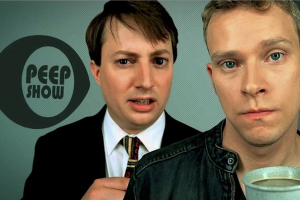English through TV: Peep Show – Moroccan Pasta
- Posted by Ideal Languages London
- Categories Teaching ideas / Lesson Plans
- Date 28/10/2022

NOTE TO TEACHERS: Please feel free to use this lesson plan in your classes, but please ensure you accredit Ideal Languages London. (This is for a one-on-one online class, C1-C2 level)
Lesson aims: To learn informal language/expressions in the
context of a dinner party/social get-together.
WARMER
Send a poster to generate interest. Discuss – have you seen this show? If yes, we do a character analysis of the main characters Mark and Jeremy. If not, I send a synopsis and we discuss (see below). Explain the format of the show.

We then discuss and predict the register of language and what capers they might get up to.
INTRODUCTION TO CONTEXT
If you were going to have a dinner party, what would you make and why? In the video, Mark makes ‘Moroccan Pasta’. What do you think this is? What is typical Moroccan food?
PRE-TEACHING VOCABULARY
Elicit through images.
To insist (verb), Baked Beans (noun), booze (noun, slang), to improvise (verb), feast (noun), backup (compound noun), to whip up (phrasal verb).
PRE-LISTENING
Looking at the pre-taught vocabulary and the questions asked in the Introduction to Context, what can you predict about the clip we will watch? What do you think it will be about?
MAIN IDEA TASK
Set task first and ask to predict before watching the video –
- Why is Mark having a dinner party?
- Why does he have to make his Moroccan Pasta?
- What exactly is his Moroccan Pasta?
https://www.youtube.com/watch?v=Y–i9lNqLjM
Answers:
Mark has invited April – a female ‘friend’ for whom he has feelings – for a dinner party. She isn’t aware of Mark’s real motive. His idea is to have a date with her only, but she thinks there will be more people there. Then, April calls Mark to ask if it’s okay if her husband comes. Mark says okay but we can tell he isn’t happy about it and he starts to get flustered as he realises he will have to make more food, hence the ‘Moroccan Pasta’. His improvised dish included pasta, lettuce, eggs and baked beans – from the original idea of pasta and sauce.
LISTENING FOR SPECIFIC DETAILS (vocabulary, expressions, pronunciation)
Send task and discuss questions and keywords before watching again.
If students are finding it too challenging, send the transcript.
The answers here are a combination of informal expressions, vocabulary and connected speech - catenation (number 7 - he says “rum and milk”, connecting the M of rum and the A of and).
1 - False. April's husband.
2 - Changing plan with only a short time before something happens.
3 - That they will behave. This phrase is usually used for dogs.
4 - No problem.
5 - Because if it is only Mark, April and Angus, it will be very awkward and perhaps they will find out about Mark's feelings for April.
6 - To take what he already has - pasta and sauce - and make it bigger so all of the other guests can eat something as well.
7 - Rum and milk, rum and water. This is used to illustrate the connected speech (catenation) where the consonant at the end of a word connects to the vowel at the start of the subsequent word, thus sounding like one word.
8 - Beans are pasta sauce.
9 - Tomato-ey. Use this to highlight that this adding y or ey is done to make an adjective from a noun and is very common with food vocabulary, although informal.
10 - Jeremy says "anything goes in Morocco", meaning there are no rules, in this case governing food. Why Morocco and not a different country? This seems to have been completely random.

PRACTICE
I give several example situations and then I ask which expression from the previous task or from the pre-taught vocabulary could be used in that situation and how it could be used. For example, I am preparing a meal but I need some help (backup), etc.
LESS CONTROLLED PRACTICE
Describe a similar situation you have found yourself in, concerning a dinner party. This could be an anecdote or a completely made-up story. Use the vocabulary and expressions learned so far. Have you ever done anything similar?
LANGUAGE PRODUCTION (writing)
- Predict how the dinner party pans out (for fun, I then send them a link to the full episode, they watch for homework, see if their predictions are right and then provide a summary of what happened). Try to incorporate some of the vocabulary and expressions.
- Write a comment about the video on YouTube, mentioning your favourite part of the scene and using at least two of the words/expressions in context.
- Write character summaries of Mark or Jeremy.
*I have also transcribed
the video if the student is struggling with listening comprehension, it can
then become a reading comprehension class.

